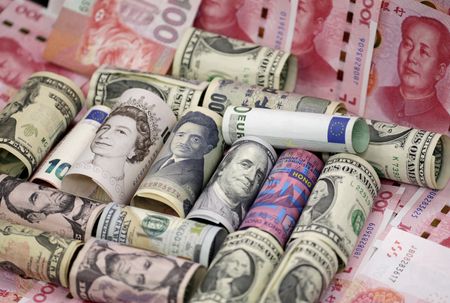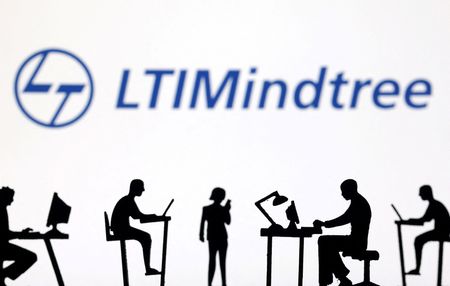By Yadarisa Shabong and Ankur Banerjee
(Reuters) – The U.S. dollar staged a tentative rebound against its major peers on Wednesday on hopes of de-escalating trade tensions and as President Donald Trump backed away from threats to fire the head of the Federal Reserve, offering relief to investors.
Markets this week have been grappling with the notion that the Fed’s independence could be under threat after repeated verbal attacks by Trump on Chair Jerome Powell for not cutting rates since the president took office again in January.
But late on Tuesday Trump appeared to back down.
“I have no intention of firing him,” Trump told reporters in the Oval Office on Tuesday. “I would like to see him be a little more active in terms of his idea to lower interest rates.”
Lee Hardman, senior currency analyst at MUFG, said the “outright denial” from Trump was an encouraging signal for the markets.
Trump and U.S. Treasury Secretary Scott Bessent separately suggested that there could be a de-escalation in U.S.-China trade tensions and any trade deal with China could “substantially” cut tariffs.
Investors hastened back to the dollar, which has been hovering near three-year lows in recent weeks and whose safe-haven status had been questioned in view of Trump’s erratic trade policies and their potential impact on the U.S. economy.
The dollar rose rapidly at the start of the trading day in Asian hours, but it has steadied since then as market sentiment remained fragile.
“As we’ve seen, Trump seems to change his mind every other day. So, when you’ve got such uncertainty over policy in the U.S., it takes more than just a couple of positive announcements to fully restore confidence,” Hardman added.
The euro eased 0.18% to $1.1397, pulling back from the $1.15 levels it saw earlier this week that marked a roughly 3-1/2-year high.
Surveys on Wednesday showed euro zone business growth stalling and Germany’s private sector contracting this month, hurt by service sector woes and trade-related uncertainty.
“That should place some downside pressure on the euro, of course. The dollar is likely to be a beneficiary on the back of that,” said Nicholas Rees, Head of Macro Research at Monex Europe.
MARKETS DON’T TRUST TRUMP
The dollar climbed more than 1% against the yen to 143.21 in early trading and was last up 0.3% at 142.085. Against the Swiss franc, the dollar was last 0.6% stronger at 0.8245, having jumped more than 1% earlier in the Asian session.
Despite its attempted rebound, the dollar is not far off its multi-year lows against the euro and the Swiss franc and seven-month low versus the Japanese yen.
“We think this is going to be a theme going forward. We will see continued shocks that place downside pressure on the dollar, repeated walk backs to see the dollar bounce. But again, the dollar will not return to previous highs,” Rees added.
“Markets don’t trust Donald Trump.”
On the China trade front, Bessent said neither side sees the status quo as sustainable, adding that the Trump administration’s goal was not to decouple the world’s two largest economies, according to a person who heard his presentation to investors at a JP Morgan conference.
Meanwhile, Trump expressed optimism that a trade deal with China could “substantially” cut tariffs. He said a deal would lower tariffs on Chinese goods, suggesting that a final deal will not “be anywhere near” current tariff rates. But he added that “it won’t be zero”.
Beyond Trump’s attacks on the Fed, investor focus has been on trade deals between the U.S. and other countries.
After setting a baseline import tax of 10% and much higher on dozens of countries earlier this month, Trump abruptly put the steeper levies on hold for 90 days for countries to negotiate less stringent rates.
White House press secretary Karoline Leavitt said 18 countries have offered proposals so far, with Trump’s trade negotiating team set to meet with 34 this week to discuss tariffs.
In cryptocurrencies, bitcoin rose over 2% to $93,661, breaking above $90,000 for the first time since March.
(Reporting by Ankur Banerjee in Singapore. Editing by Kim Coghill, Hugh Lawson and Chizu Nomiyama)










